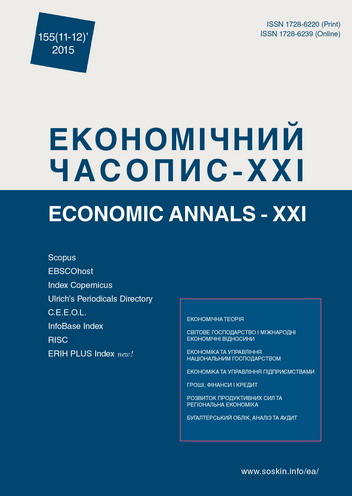Political and sociocultural factors of post-Soviet economic regionalisation: from economic anthropology to identity economics
Political and sociocultural factors of post-Soviet economic regionalisation: from economic anthropology to identity economics
Author(s): Maksym KyrchanivSubject(s): Economy
Published by: Institute of Society Transformation
Keywords: Economic Theory; Economic Anthropology; Identity Economics; Regionalisation
Summary/Abstract: Introduction. The author analyses the prospects of studies in economic regionalisation in the context of economic anthropological approach. Economic anthropology develops as a set of interdisciplinary post-modern and post-institutionalism methods which are widely and actively used for the analysis of economic processes in traditional and transitional societies. The purpose of this article is to analyse the characteristics, trends and systemic features of processes of regionalisation and territorial differentiations of the post-Soviet landscapes of Ukraine and Russia in the economic anthropological context. Results. The author has analysed the main directions of economic and political regionalisation in Ukraine and the Russian Federation. The author presumes that various forms and local versions of national anthropological economic realities have historically arisen in the post-Soviet countries. Formally, the European choice and the choice of values of a market economy are economic and anthropological markers that form the image of Ukraine. Anthropological roots of the Russian model of economic development are diametrically different, because modern Russia is developing within the framework of the post-Soviet inertia model. The analysis of post-Soviet economic realities of Russia and Ukraine has actualised the roles of informal institutions and depth of criminalisation of economies. The interpretation of the results is presented in the article. The analysis of the post-Soviet economies of Russia and Ukraine can significantly broaden the range of interpretations of modern economic processes. Economic anthropology can be accepted as an effective paradigm that provides economists and political scientists with new and wide opportunities for studies in economic processes in comparative perspective. The transition from economic anthropology to identity economics will also assist to conduct more productive theoretical studies of transitional societies. Conclusions. Economic anthropology and identity economics are promising directions of interdisciplinary character in modern economics. They provide scientists with a wide range of tools, practices and strategies that can be effective in the analysis of economic fragmentation and regionalisation processes. These interdisciplinary methods actualize the potential of economic anthropology in studies of countries with economies in transition at macro and micro levels.
Journal: Економічний часопис - ХХІ
- Issue Year: 155/2015
- Issue No: 11-12
- Page Range: 22-28
- Page Count: 7
- Language: English

